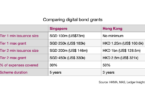The Data Foundation, in conjunction with Booz Allen Hamilton, has published its findings after a year-long research project on blockchain. The report outlines seven applications for the use of blockchain technology in the US government.
The foundation was created in 2016 as a nonprofit research organization by the founder of the Data Coalition. The Data Coalition is a 2012 group advocating for open data in government and has contributed to US government reforms.
The two groups work in tandem; the coalition advocates for policy reforms while the foundation produces open source programming and research in support of open data. It boasts sponsors such as Bloomberg, LEI, Grant Thornton, and Booz Allen Hamilton.
The report is in line with the Data Foundation’s key aims, as the research considers applications of blockchain where they offer security, trust, and transparency. It identifies seven federal blockchain projects, all of which are at a proof of concept stage. These include the below projects in health, administration, and defense.
Health
The US Food and Drug Administration (FDA) already has the Information Exchange and Data Transformation (INFORMED) initiative. INFORMED is developing a blockchain with IBM based on Hyperledger for data exchange. However, this report suggests that blockchain could be applied even further to give patients the ability to sell their health data.
As the “most ambitious blockchain project” considered by the Data Foundation, ordinary people could use smart contracts to sell their medical data to researchers. Smart contracts would provide trust over the use of sensitive and private data, along with transparent terms on how it would be used.
On the other hand, if patients do not want their information to be used, they would have the control to prevent that from happening. This is thanks to their role as owner of the data on the blockchain.
Grant administration
The US Department of Health and Human Services currently provides support for other agencies managing grants. A complex system, federal grants are made by 26 major agencies which issue $750 billion to thousands of recipients. Information is poorly maintained for use between agencies, so often long processes are repeated needlessly.
GrantSolutions provides the administration support across agencies to reduce inefficiencies. The service is already producing a blockchain solution to address complicated information management. As a way of moving towards open data, the Data Foundation is optimistic about this application.
Also built on Hyperledger’s platform, the permissioned blockchain has one block per grant. The naturally scalable structure allows for the storage of the predicted 70,000 blocks per year. Additionally, GrantSolutions can control who, as nodes, has authority to contribute while the blockchain provides trust that the shared data has not been tampered with.
Defense
Supply of materials continues to be an issue for deployed military units. For example, if a small part of an old weapons system breaks, the military has to find that particular legacy part (or produce it) and find a way to transport it to the unit securely. This process can cause delays and the transporting units unnecessary danger.
The Data Foundation suggests a somewhat novel solution: 3D printing. Producing parts on-site would replace costly transport and storage of many individual pieces of equipment. Plus, the printer could theoretically produce any part as long as it is not too large.
However, it is imperative that the 3D printed parts are of the same quality as those procured off the shelf. This is where blockchain comes in; to provide trust in quality control. The report suggests that the Department of Defense could maintain an exact digital library of parts. Blockchain technology allows for immutable and secure storage of blueprints, so they are not tampered with or stolen. Vendors of the components could also be paid automatically with smart contracts.
Already in the pilot stage, developed by Moog, “the project will enable not just improved readiness of military operations but could drastically reduce the costs of transporting and delivering military parts around the world.”






